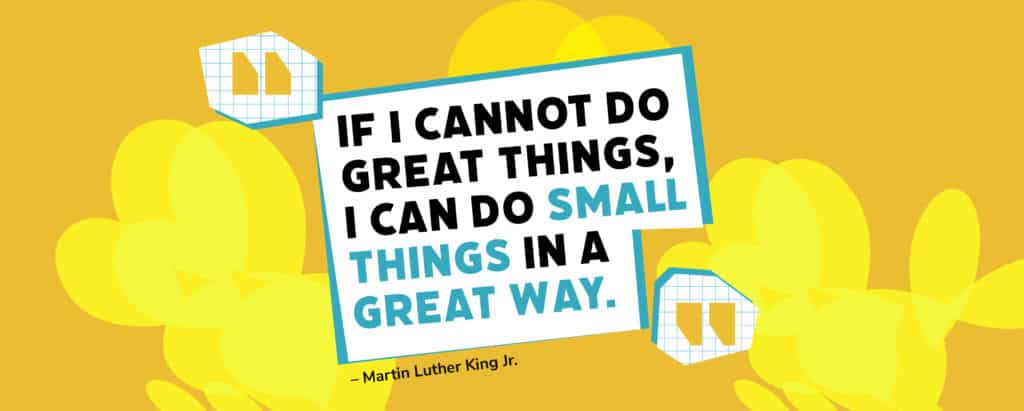Through the lockdowns of 2020 and 2021, many of us have been thrilled to see how much money we’ve saved due to not being able to go out. However, if you’re anything like me you might have also found you’ve been struck with a case of itchy phone fingers – A condition which causes you to purchase homewares, clothing, books, games, craft kits and, more recently, garden decor from online retailers, on an almost daily basis. It’s completely understandable. We’ve needed to make our homes more comforting and we’ve naturally flocked to any items that might help to keep us entertained and upbeat.
It’s all too easy – just a few clicks and you can get items delivered within days. Sometimes even hours. This used to be an option almost exclusively available to Amazon shoppers but smaller online retailers are catching up.
As the world opens up again many of us will also be keen to support the high street. However, as we become increasingly conscious of our environmental impact I can’t help but wonder, is ethical consumerism ever really possible?
One of the recent challenges many have reported facing is driving to the local tip or recycling centre only to find out it’s been temporarily closed due to being full. Understandably, signs like these carry a strong sense of foreboding. How much more can we throw away to be replaced with new trinkets? The truth is what we throw away doesn’t disappear. At least not for a vast amount of time. Even destroying our cast-offs has an environmental impact.
Yet, it’s not all doom and gloom. Whilst many believe we should go back to our grandparent’s way of repairing and reusing, the world is shifting to support our growing consumerism by minimising the effect on the environment.
Recycling and repurposing are obvious examples. Many smaller businesses are planting their ethos in achieving a zero carbon footprint through selling goods that have been entirely produced from recycled or upcycled materials. Pressure coming from consumers is also driving governments and local councils to ramp up their environmental initiatives and larger corporations are bowing to public concern and increasing the longevity of their products.
Businesses and manufacturers have also increased their scope for choice of materials. For a good many years, cost drove decisions in sourcing materials for products but, responding mostly to generations Y and Z, ethics are becoming a real driver in manufacturing decisions. For example, many consumers are moving toward natural fibres which decompose far quicker than manmade fibres. Furthermore, there has been an increase in bamboo cotton because bamboo is a regenerative material. Unfortunately, there is also the issue that potentially the chemicals it takes to produce bamboo cotton items has a detrimental effect on the environment. Conflicts like these make it very difficult for both companies and consumers to be sure whether the decisions they’re making are ethical. Even when they are putting time and energy into researching what from and how products are made.
Perhaps we need to focus instead on longevity. For example, some suggest that we should only buy items of clothing that we’re sure we’ll wear at least 30 times. This doesn’t seem at all daunting for items such as comfy jumpers, PJs and jeans, but what about occasion wear? There is also a vast difference between wearing something 30 times over six months and then throwing it away, and wearing something once per year over a 30 year period. Some items are made to a high enough quality to stand the test of time, whereas others are made to be throwaway fashion. The latter are most often made of manmade fibres and can take years to decompose. So although we may feel we’ve worn them to death, they might take decades to actually disintegrate. Whereas, an item made of natural materials often demands less washing and may well keep its shape and strength for years. Once discarded, these items might decompose naturally back into the soil fairly quickly.
So, if we buy into consumerism then can we ever be ethical? This is a complex question which we will further explore in other blog posts. Yet, the simple answer is yes. Here’s the price though – we must learn to question our purchases. That is key to reducing our environmental impact.
As consumers, we are being opened up to choice. Do we buy a cheap item that may only last a couple of years or invest in something classic we will treasure for decades? Can we commit to buying more from ethical companies that produce products made only from sustainable materials?
The difficulty is ethical consumerism quite often comes with a higher price tag. Not to mention many of us are time-poor. Whilst we may intend to cut up ASOS packaging to line our plant pots, for those of us who are working and perhaps also balancing family responsibilities it’s a lot easier to order fitted lining online that can arrive next-day delivery.
The point is that we have choices now and we do have the power to drive ethics in business by being ethical consumers. Whilst choice can seem daunting it is also empowering. Consumers have the power now to halt environmental impact on their purchases but what we need to do is learn to take the sustainability factor into account with every purchase we make. To not only ask ourselves if we can afford an item but also can we justify it in terms of carbon footprint? History shows us that when driving change it’s not usually the big changes that have the most impact. Rather, it is the small choices we make.
“If I cannot do great things, I can do small things in a great way.”
– Martin Luther King Jr.







